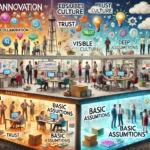When we talk about teamwork, we usually think of things like collaboration, effective communication, and creativity. But the truth is, behind every successful team, there’s a complex game of power, politics, and influence at play. These elements often go unnoticed, yet they play a crucial role in shaping a team’s performance and success.
In this blog, we’ll dive into these three concepts and explore how they can be powerful tools for growth—or dangerous traps leading to conflict.
Power in Teams: A Tool or a Threat?
What is Power?
Power is the ability to influence others or change circumstances. In teams, power can come from different sources:
- Formal Power: Stemming from a person’s position or role within an organization.
- Example: A team manager who makes key decisions.
- Personal Power: Rooted in an individual’s personality, skills, or relationships.
- Example: A team member whose advice is trusted by everyone, even without a formal title.
Why Does Power Matter?
- It can be used to resolve conflicts and drive the team toward its goals.
- But if mismanaged, it can lead to abuse or internal disputes.
Challenges:
- Power can quickly shift from a growth tool to a means of control.
- Powerful individuals may dictate decisions instead of listening to diverse opinions.
Solutions:
- Transparency in how power is used.
- Balancing formal and informal power dynamics.
Politics in Organizations: The Art of Managing Relationships
What is Politics?
Organizational politics involves using tactics and relationships to achieve objectives, especially when resources are limited or conflicts arise.
Positive or Negative?
Politics isn’t always a bad thing. When used wisely, it can:
- Facilitate collaboration among team members.
- Help solve complex problems.
- Increase influence for achieving beneficial goals.
Example of Positive Politics:
A project manager leveraging relationships across departments to secure more resources for their team.
Challenges:
- Negative politics can lead to factions, distrust, and reduced team cohesion.
- Team members might focus on political games instead of actual work.
Solutions:
- Transparent decision-making processes.
- Cultivating a culture of trust and collaboration.
Influence: The Soft Power of Teams
What is Influence?
Influence is the ability to persuade others without relying on formal authority or political maneuvers.
- Example: A team member who inspires collaboration through positivity and expertise.
Types of Influence:
- Logical Influence: Using data and reasoning to convince others.
- Emotional Influence: Building emotional connections to gain support.
- Collaborative Influence: Engaging others through cooperation and shared goals.
Why is Influence Important?
- Strengthens team morale.
- Enhances trust and builds meaningful relationships.
Challenges:
- Influence can be misused for personal agendas.
Solutions:
- Upholding ethical standards within the team.
- Ensuring transparency in intentions and objectives.
Power, Politics, and Influence in Action
Imagine a marketing team planning a major campaign:
- Power: The team manager decides that the campaign will focus on social media.
- Politics: A team member uses their connections with the design department to get premium-quality graphics.
- Influence: Another member presents a compelling idea that persuades the whole team to change the campaign launch date.
How to Manage These Three Forces Effectively
- Find the Right Balance:
- Power should come with responsibility.
- Politics should serve shared team goals.
- Influence should be built on trust and respect.
- Encourage Open Feedback:
- Allow team members to express concerns about power and politics.
- Use feedback to improve decision-making.
- Strengthen Influence Skills:
- Encourage team members to use logical and emotional influence to solve problems.
- Prioritize Transparency:
- Keep decision-making processes and team relationships clear and open.
Power, politics, and influence are inseparable parts of teamwork. What truly matters is how we use them—either as constructive tools for progress or as sources of division and conflict.
A great team is one that uses power to lead, politics to collaborate, and influence to inspire.
Have you ever experienced these dynamics in your team? Let’s talk! 😊









